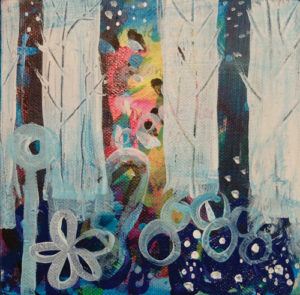by Sam McCarthy
UMEUS Foundation
For many women there is a decision made, usually in conjunction with a significant other, to ‘have a baby’ or ‘start a family’. It might be discussed, perhaps somewhat romantically, and framed from our own lived experience of childhood, what we will never do as parents. How many are reading this and remembering the phrases, “it’s not going to change us, we will still travel/go dancing/work…” and “we won’t be talking about our child all the time like (fill-in any parents name you knew before you had a baby)…” Or perhaps you were seduced by the idea of being blissfully radiant in pregnancy, ‘natural childbirth’, ergo slings and shared responsibility?
Even for those who chose to walk the path without a partner, and the many women who have no choice in the matter at all, the decision to bring a new life into the world is one we have no experience in making first time around, even if we’ve been surrounded by babies and children; just ask any midwife, nursery carer or teacher. Within all this thought and talk of pregnancy and the delights we will call our children, how many of us have asked ourselves, how do I become
a mother?
We’ve all had one at some point, some maybe two or more, in the forms of in-law, step or adoptive/biological. But how many of those in the hood have really shared their experience with us BEFORE we were staring into the abyss of broken sleep, emotional weightlifting and relationship upheaval? The monumental shifts that accompany the transition from woman to mother are rarely spoken of outside of this shadowy fraternity.
 Perhaps the elemental nature of motherhood can’t quite be understood until we are ‘in’ our experience, or maybe we wouldn’t head on this collision course with life if we knew what was ahead? If this were the case, why do so many of us go on to do it time and again? Creating life can be addictive, because although oxytocin is understood by endocrinologists as an antidote to craving, the positive feedback mechanism that controls its release actually helps anaesthetise us a little, or diminish the sensations of discomfort, and feelings of turmoil that are intrinsically linked with pregnancy, childbirth and motherhood.
Perhaps the elemental nature of motherhood can’t quite be understood until we are ‘in’ our experience, or maybe we wouldn’t head on this collision course with life if we knew what was ahead? If this were the case, why do so many of us go on to do it time and again? Creating life can be addictive, because although oxytocin is understood by endocrinologists as an antidote to craving, the positive feedback mechanism that controls its release actually helps anaesthetise us a little, or diminish the sensations of discomfort, and feelings of turmoil that are intrinsically linked with pregnancy, childbirth and motherhood.
When we are deep in the throes of becoming a mother, we often forget ourselves, and without intending to, so do others around us. Whilst pregnancy isn’t necessarily a glowing period for all, many women experience being regarded, honoured even (unless you’re on the 17:59 from London), and taken care of whilst carrying our precious load. What to expect when you’re expecting, pregnancy and birth; the industry around these very specific periods of time are festooned with ideas, methods and opinions, and many are eager to inform. As the excitement mounts, children’s clothes are cooed over, yoga sessions are chanted in and birth plans are written. Whatever happens at birth, statistically, becoming pregnant is the most dangerous thing a woman does in her lifetime. But now there’s a baby and attention shifts from you to your newborn.
We all respond differently to the awakening of motherhood. It’s a realisation that comes quickly for some, and as a quest through a submerged haze for others. The magnitude of decisions that arise as we begin to meet our new responsibility can be weighty and unwieldy. Breastfeeding (or not), back to work (or not), childcare (or not), intimacy with partner (or not), have another child (or not), this list is barely begun.
So, what happens if we meet the responsibility of our new state or experience of having or rais ing a child and everything that comes with it, not just with gratitude, which helps lessen the sense of heaviness, but also with conviction, so as to empower us?
ing a child and everything that comes with it, not just with gratitude, which helps lessen the sense of heaviness, but also with conviction, so as to empower us?
Wholly embracing that we are the life givers, more often the primary carers, the chefs, the emotional weight bearers, the cleaners, the educators, the travel agents, the event organisers, and so much more, can elevate us, rather than drag us down, and help us to assert ourselves so that we can regard ourselves positively for what we achieve every day. Once we hold ourselves in this regard, it is easier for others to value us and for us to get our needs met.
Researchers at Washington University studied new mothers with varying degrees of stress. They wanted to know if support from community affected the way a parent relates to their children and their ability to raise them. The results were clear. Mothers without strong support from community had higher levels of stress, and mothers with higher levels of stress were more worn down and pessimistic about parenting. They also found the opposite true: mothers with strong support from their communities had lower levels of stress and were optimistic.
UMEUS Foundation was created to support women who happen to be mothers, because as much as not all women carry and birth, most women find themselves being mothers, sometimes as carers, sometimes as partners, often to their own parents, but mostly to humanity.
We believe in cultivating community through compassion and creativity. At UMEUS our central tenets are to trust mindful, yogic and humanistic, person centred approaches to supporting development. That applies to all stages of development, but most importantly our own.
Sam McCarthy, UMEUS co-founder, psychotherapeutic counsellor, mother, creative producer, wrangler of words.
www.umeusfoundation.org











